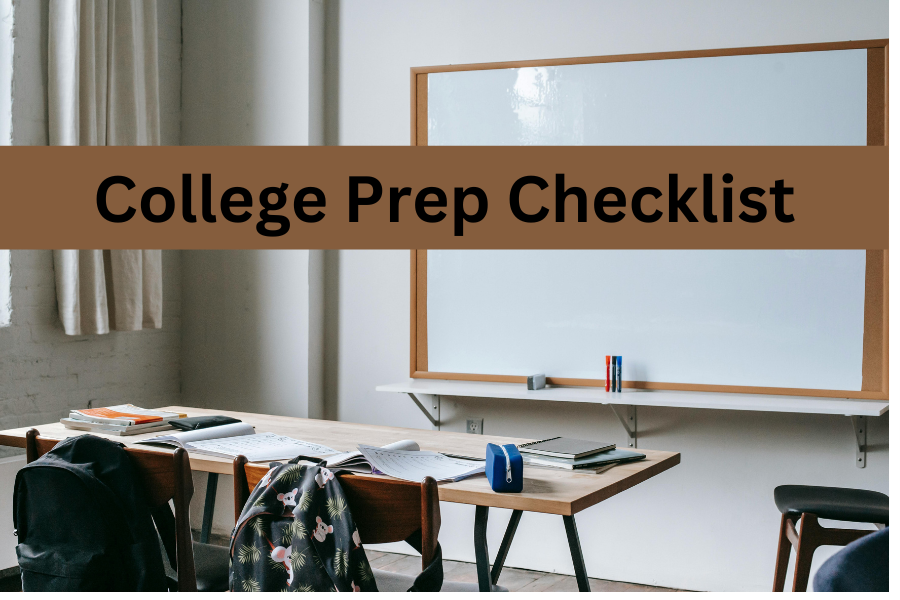Simple College Prep Checklist to Make Your Life Easier
This simple but useful college prep checklist will start your college search off on the right foot.

Like most things regarding school, there are a ton of resources that can help you with the college process. Leveraging resources such as guidance counselors, college fairs, online tools, and test prep resources can help you make informed decisions and stay organized throughout the process.
From researching colleges to preparing for standardized tests and building a strong academic and extracurricular record, there are several key components to consider when preparing for college. This college prep checklist will go through different tips and resources that will ensure that the start of your college preparation process is organized and helpful.
With careful planning, research, and dedication, you can set yourself up for success in your college journey. These 7 tips offer a great foundation for the college preparation experience. By following these tips and staying proactive and organized, you can navigate the college preparation process with confidence and set yourself up for success in pursuing your higher education goals.
This post is all about a college prep checklist.
College Prep Checklist
1. Create A College List

Before you start anything create a list of colleges that you would like to look into. This can just be schools you're curious about or it can be schools you already know a lot about. Keep in mind this list is absolutely not fixed yet. In fact, it will probably change A LOT.
When creating this list I would recommend separating the schools into safety, target, and reach categories. If you don't know what these are your safety categories are the schools you're most likely to get into. These should have an acceptance rate of 50% and above depending on how competitive you feel your application will be.
Target schools are schools that are in the exact range of what you think you could get into. They're not too easy, but they're also not super hard. Again this depends on your application strength but these acceptance rates could range anywhere from 60% to 30%. Lastly, reach schools are schools that are a little bit out of your range. These have acceptance rates of 30% and up.
Create a list with equal numbers of all these types of schools and then you're ready to begin to do in-depth research.
2. DO YOUR RESEARCH!

Beginning research for the college process can be daunting. Start by reflecting on your priorities and non-negotiables. I would recommend figuring out what things you feel like you absolutely need in a college and what things are a bonus that you'd like.
Maybe it's a strong program in your intended major, a vibrant campus community, opportunities for research or internships, or specific extracurricular activities. These are the pillars that will shape your college experience, so it's important to identify them early on. When you know what you want and need college-wise, then I would recommend figuring out how many of your schools offer these things.
Again, keep in mind that you want to have a few safeties, targets, and reaches that you truly love. Remember that building your college list is about balance. This party might take time because it can be a process to figure out what you feel like you need in college. Don't rush on this, it's incredibly important.
After you know what you want, take time to look up some of the factors that have shaped other people's college decisions. This might give some ideas that you might not have considered on your own.
3. College Tours

Tour as many colleges as you can. I know this can be difficult, especially if you want to tour a lot of colleges that are far from your home. It can be super expensive and difficult to find a time that aligns with your school schedule. For some people, touring college just doesn't feel like an option.
However, there are a ton of colleges that have, fly-in programs. This is basically where you apply to have the school pay for a trip for you to tour/visit the school. This helps the school with their exposure and allows them to recruit more students to apply and potentially go to their school. However, these schools do tend to be the more selective ones.
Some of the schools on this list are: Amherst, Bates, Bowdoin, Wash U in St. Louis, Carlton, and Indiana University. However, there are a ton of online resources that have more full and extensive lists.
If you feel like fly-in programs aren't an option for you, then I would just try to tour as many local universities as possible, so you can get a feel for what college campuses can be like.
4. Understand Financial Aid Options

This is SO IMPORTANT for anyone and everyone applying to colleges. Understanding the financial aspects of college applications is absolutely crucial for every student and family navigating the admissions process. There are so many schools that are need-blind, need-aware, or no-loan schools. Additionally, there are a ton of scholarships you can apply for when looking at schools. Take a look at the post below that highlights 9 scholarship options as well as ideas on how to find many more.
Need blind schools because they don't factor your family's financial status into their decision to admit you. This basically means that these schools won't discriminate against students who will need more financial aid from the school. This approach promotes equity and access to higher education, as students are judged solely on their merits and qualifications.
No-loan schools are schools that guarantee that the college will meet 100% of the student's demonstrated financial need without loans in the financial aid package. The concept of no-loan schools is particularly enticing for students concerned about accumulating substantial debt.
Need-aware schools basically do the opposite of need-blind schools and they take a student's financial situation into account. However, this doesn't necessarily mean disadvantaged students are automatically excluded
Make sure you take the time to research all of the options and other financial aid options when you're applying. A little planning here can save you a lot of money.
Related Post: 9 Amazing Scholarships for High School Seniors
5. Summer Programs or Internships

You want to make sure that the summer programs and internships have an overarching theme or connecting idea. Don't do a ton of programs with no aim just to have something on your college applications. Do a lot of extracurricular activities that are focused on something you actually care about.
You want your accomplishments to have character behind them, and it should be clear why it matters to you. Whatever you spend your time on should be focused and driven. Try and ensure that all of the activities you're planning on putting on your college application aren't aimless and arbitrary.
The extracurriculars and activities category on college applications is your place to really let the work you've done throughout high school shine so make sure you're picking things that accurately portray you and your interests the way you want them to.
6. Develop Your Writing Skills

This tip is helpful even before you actually begin applying to college. Honing your storytelling and writing skills well before the college application process begins can significantly enhance your application. Spend a couple of months or even weeks practicing descriptive story-telling. Think about all of the different angles you want to represent yourself from and take the time to brainstorm how you want to start your essay.
Challenge yourself to explore different perspectives, voices, and tones. By diversifying your writing practice, you'll not only strengthen your technical abilities but also discover your unique voice and storytelling approach. A great way to practice your writing is just to write more often. Try to work writing into your daily routines, maybe try out different writing styles while journaling, or use a different approach to write an essay for school.
Whatever you do, make sure that you're practicing your writing skills as often as possible leading up to when it's time to actually write your essay. his proactive approach will empower you to articulate your experiences and aspirations with clarity, depth, and authenticity when the time comes to pen your college applications.
7. Build Up Your GPA

As soon as you can you should focus on trying to build your GPA. Having the most competitive GPA you can earn is so vital to opening up as many opportunities as possible. As soon as you can start to raise your grades it's always helpful. While it's ideal to have a stellar GPA throughout your high school career, it's never too late to start improving if your grades aren't where you want them to be.
If that means you need to start looking for simple tutoring resources then that's what you should be doing. Find any way you can to slowly start improving your grades. If they're already really good then just ensure you're maintaining them. You don't want them to slip now, just when you need them the most.
Consistency is key when it comes to improving and maintaining your GPA. Set realistic goals for yourself and work steadily towards them. Even small, incremental improvements can add up over time and contribute to a stronger overall academic record. Whether you're working to raise your grades or striving to maintain your current level of achievement, prioritize your GPA and take proactive steps to ensure your academic success. Your efforts now will pay dividends in the form of expanded opportunities and brighter prospects down the road.
This post was all about a college prep checklist.
Another Post You Might Like: Quick Guide to: Tutoring for High School Students